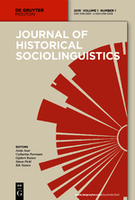
Journal of Historical Sociolinguistics
metrics 2024
Illuminating Linguistic Evolution in Historical Context
Introduction
The Journal of Historical Sociolinguistics is a distinguished publication focusing on the intricate relationships between language and society from a historical perspective. Published by WALTER DE GRUYTER GMBH in Germany, this journal (ISSN: 2199-2894, E-ISSN: 2199-2908) is recognized for its rigorous scholarship, ranking in the Q2 quartile in Linguistics and Language (2023), highlighting its relevance and impact within the academic community. With Scopus rankings placing it at #326/1088 in Arts and Humanities and #386/1167 in Social Sciences, this journal is essential for researchers and scholars interested in the dynamics of language evolution, sociolinguistic shifts, and historical context. Through its insightful articles and contributions, the journal aims to illuminate the nuanced interplay between linguistic change and social factors over time, making it an invaluable resource for students, professionals, and academics alike. The journal operates under an open-access model, ensuring that knowledge is disseminated widely and freely accessible to those engaged in the cutting-edge studies of sociolinguistics.
Metrics 2024
 -
- 0.20
0.20 -
- -
-Metrics History
Rank 2024
IF (Web Of Science)
JCI (Web Of Science)
Quartile History
Similar Journals
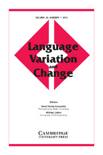
Language Variation and Change
Exploring the Dynamics of Linguistic DiversityWelcome to Language Variation and Change, a prestigious journal published by Cambridge University Press and dedicated to the rigorous exploration of linguistic diversity and its evolution. With an ISSN of 0954-3945 and an E-ISSN of 1469-8021, this journal has been a pivotal platform for scholars since its inception in 1989, continuing to publish cutting-edge research up to 2024. Language Variation and Change is recognized in the top quartile for Linguistics and Language (Q1) and holds an impressive Q2 ranking in Education for 2023, underscoring its significant contribution to these fields. Its strong Scopus rankings—placing it in the 86th percentile for Arts and Humanities in Language and Linguistics—highlight its impact and quality. This journal aims to foster a deeper understanding of the dynamic interplay between language and society, making it essential reading for researchers, professionals, and students eager to engage with the latest findings and theoretical discussions in the arena of sociolinguistics. Stay connected with the evolving landscape of language studies through Language Variation and Change.

Linguistics Vanguard
Exploring the nuances of language and communication.Linguistics Vanguard is a premier academic journal dedicated to advancing research in the field of linguistics and language studies, published by the esteemed Walter de Gruyter GmbH. With its impact factor placing it in the Q1 category for Linguistics and Language as of 2023, the journal demonstrates a significant influence in the academic community, boasting a Scopus rank of #194 out of 1088 in Arts and Humanities and a commendable percentile of 82. Since its inception in 2015, the journal has served as a critical platform for disseminating innovative research and fostering dialogue among scholars and practitioners, encapsulating a wide range of topics within linguistics. Despite being a subscription-based publication, it maintains an open approach to scholarship, encouraging robust academic exchange. Located in Berlin, Germany, at Genthiner Strasse 13, D-10785, Linguistics Vanguard is a must-read for those seeking to stay at the forefront of linguistic research and theory.

Verba-Anuario Galego de Filoloxia
Elevating Philological Studies with Quality ScholarshipVerba-Anuario Galego de Filoloxia is a prominent academic journal published by UNIV SANTIAGO COMPOSTELA, dedicated to advancing the field of linguistics and language studies. Hailing from Spain, this journal provides a vital platform for researchers, educators, and students interested in Galician philology and its broader linguistic implications. Although it operates under traditional access models, the journal’s commitment to quality research is reflected in its categorization within Q3 in Linguistics and Language for 2023, showcasing its significant contributions to the field. Encompassing a convergence period from 2017 to 2024, Verba garners attention in both the Arts and Humanities and Social Sciences domains, with its Scopus rankings highlighting its moderate impact within these categories. By nurturing scholarly dialogue and disseminating innovative studies, Verba-Anuario Galego de Filoloxia plays a crucial role in promoting linguistic research, making it an essential resource for professionals and academic institutions striving to explore the complexities of language and philology.
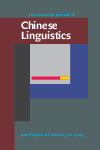
International Journal of Chinese Linguistics
Advancing Knowledge in Chinese Language StudiesInternational Journal of Chinese Linguistics is a distinguished publication that delves into various aspects of linguistic studies pertaining to the Chinese language. Published by John Benjamins Publishing Co, this journal stands out for its commitment to advancing the knowledge and understanding of Chinese linguistics within the global academic community. With an impact factor that places it in the Q2 quartile of linguistics and language, the journal is indexed in prominent databases, achieving ranks of #501 in Arts and Humanities and #580 in Social Sciences. These rankings reflect the journal's dedication to maintaining high scholarly standards and its relevance in both linguistic research and practical applications. While not categorized as Open Access, the journal provides necessary access through institutional subscriptions, thereby ensuring that valuable research reaches a broad audience. Covering a wide range of topics from syntax and phonetics to sociolinguistics and applied linguistics, the International Journal of Chinese Linguistics serves as an essential resource for researchers, professionals, and students seeking to deepen their understanding of the intricate relationship between language and culture in the Chinese context. With converging years from 2019 to 2024, it continues to evolve, reflecting ongoing developments in the field.
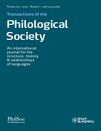
TRANSACTIONS OF THE PHILOLOGICAL SOCIETY
Fostering Innovation in Linguistic ResearchTRANSACTIONS OF THE PHILOLOGICAL SOCIETY, published by Wiley, is a prestigious journal focusing on the fields of linguistics and language studies. With a rich history that spans over 180 years, having been established in 1842, this journal continues to contribute significantly to the academic discourse on language and linguistics. It holds an impressive impact factor and ranks in the Q2 category for both Linguistics and Language in the 2023 category quartiles, underscoring its relevance and scholarly influence, as evidenced by its rankings in the Scopus database. Researchers, professionals, and students will find this journal invaluable for accessing high-quality research articles that illuminate various aspects of language and linguistics. While the journal does not currently offer open access, it remains a vital resource for anyone dedicated to advancing knowledge in these fields. Its address in the United Kingdom underscores its international reach and commitment to academic excellence.
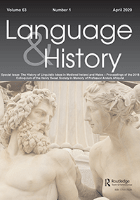
Language & History
Innovating Research at the Intersection of Language and HistoryLanguage & History is a distinguished journal published by Routledge Journals, Taylor & Francis Ltd, focusing on the intersection of linguistics and historical context. With an ISSN of 1759-7536 and an E-ISSN of 1759-7544, this journal serves as a vital platform for scholars exploring the dynamic relationship between language evolution and historical narratives. It is recognized for its contributions to the field, holding a Q2 ranking in Linguistics and Language for 2023, reflecting its esteemed position among peer publications. Indexed in Scopus with notable rankings in both Arts and Humanities and Social Sciences, Language & History aims to foster innovative research, shed light on language change, and encourage cross-disciplinary dialogue. The journal operates without open access, providing rigorous peer-reviewed content for researchers, professionals, and students alike, ensuring that cutting-edge studies remain at the forefront of linguistic research. Published biannually, it continues to attract a diverse array of contributions that enrich the understanding of language within historical contexts, making it an essential resource in the academic community.

Treballs de Sociolinguistica Catalana
Bridging Language and Society for a Richer Catalan ExperienceTreballs de Sociolinguistica Catalana is a distinguished open-access journal published by the Institut d'Estudis Catalans, focusing on the critical intersection of sociology and linguistics within the Catalan-speaking regions. With an ISSN of 0211-0784 and an E-ISSN of 2013-9136, this journal has been a vital platform for research since its transition to open access in 2007, facilitating broad dissemination and accessibility of scholarly works. Located in the heart of Barcelona, Spain, the journal aims to foster dialogue and understanding of sociolinguistic phenomena, promoting collaboration among researchers, professionals, and students. By publishing high-quality, peer-reviewed articles that explore language use in social contexts, Treballs de Sociolinguistica Catalana contributes significantly to the study of Catalan language and its sociocultural implications, positioning itself as an essential resource for those invested in the dynamic field of sociolinguistics.
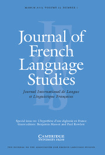
Journal of French Language Studies
Elevating Scholarly Discourse in French StudiesJournal of French Language Studies, published by Cambridge University Press, is a prestigious and leading journal in the field of linguistics and language that provides a platform for scholarly articles and research findings relevant to the French language and its various dimensions. With an impressive Q1 ranking in the 2023 categorization and ranked #257 out of 1088 in Scopus for Language and Linguistics, this journal plays a pivotal role in advancing the study of French linguistic methodologies, sociolinguistics, and applied linguistics. Since its inception in 1991, the journal has continually contributed to the academic community, attracting innovative investigations and theoretical discussions that enrich understanding and research in the field. Researchers and students enjoy comprehensive access to critical analysis and emerging trends, and as it continues to converge towards 2024, the journal promises to remain an essential resource for exploring the evolving landscape of French language studies.

Slovo a Slovesnost
Cultivating Knowledge in the Heart of LanguageSlovo a Slovesnost is a prominent academic journal dedicated to the field of linguistics and language studies, published by the Czech Language Institute of the Czech Academy of Sciences. With an ISSN of 0037-7031, the journal has established itself as a significant resource for researchers and professionals within the linguistic community. Its rigorous selection process and impactful contributions have earned it a commendable Q2 ranking in Linguistics and Language as of 2023, as well as Scopus rankings in the 58th percentile for Language and Linguistics. Offering insights into both theoretical and applied linguistics, Slovo a Slovesnost serves as an essential platform for cutting-edge research, fostering dialogue among scholars, and enriching the study of language within the Czech Republic and beyond. Although it does not provide open access, the journal supports a subscription model that ensures high-quality dissemination of knowledge to a dedicated audience of linguists, educators, and linguistic scholars. With coverage converging from 2004 to 2024, it continues to thrive as a vital corner of linguistic scholarship.

NEUPHILOLOGISCHE MITTEILUNGEN
Exploring the Depths of Language and LinguisticsNEUPHILOLOGISCHE MITTEILUNGEN, published by the esteemed Modern Language Society, stands as a significant contribution to the domain of Language and Linguistics. With a history dating back to 1971, this journal has consistently provided an academic platform for researchers and scholars, navigating through the intricacies of philology and linguistic studies. Although it is indexed in Scopus with rankings reflecting its position in the Arts and Humanities and Social Sciences categories, it currently does not offer Open Access, which may require interested parties to seek institutional access for its wealth of content. The journal has experienced periods of coverage discontinuation in recent years, yet it remains a valued source for advancing the understanding of language theories and linguistic practices. Its location in Helsinki, Finland, offers a unique European perspective on global linguistic issues. The journal is ideal for those looking to engage with evolving linguistic trends and contribute to contemporary discussions in the field.